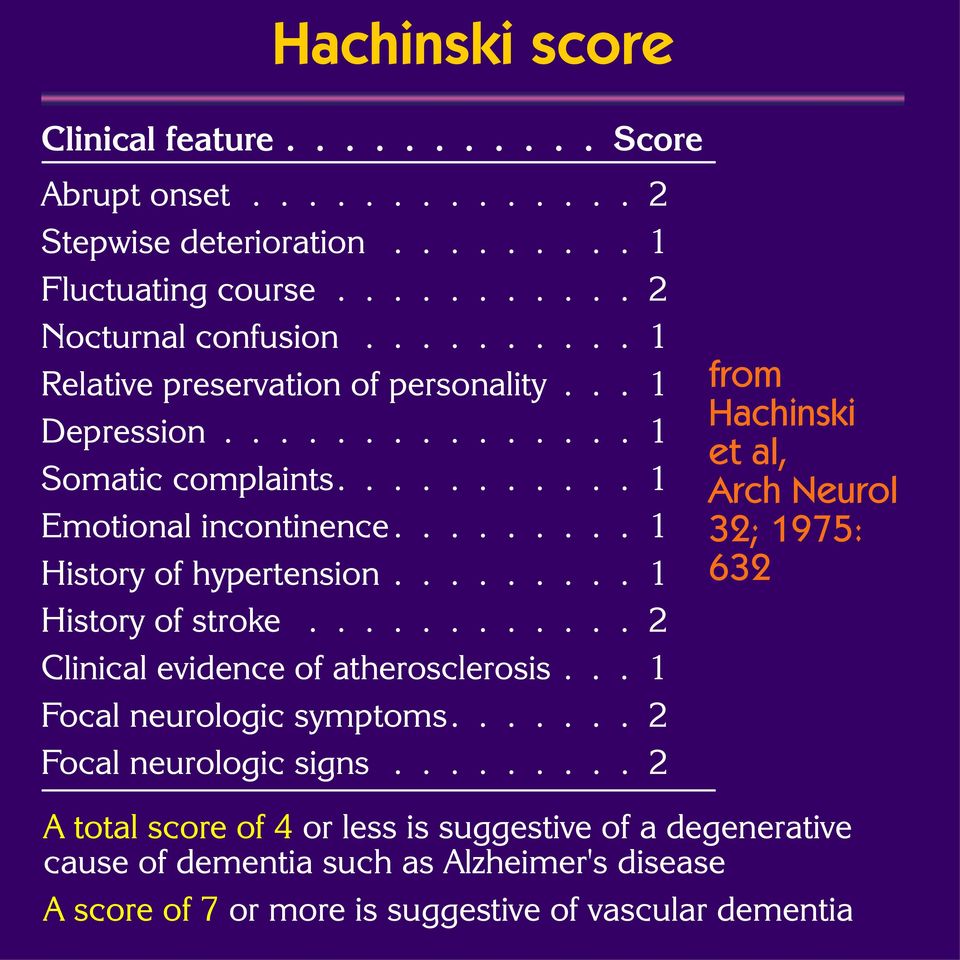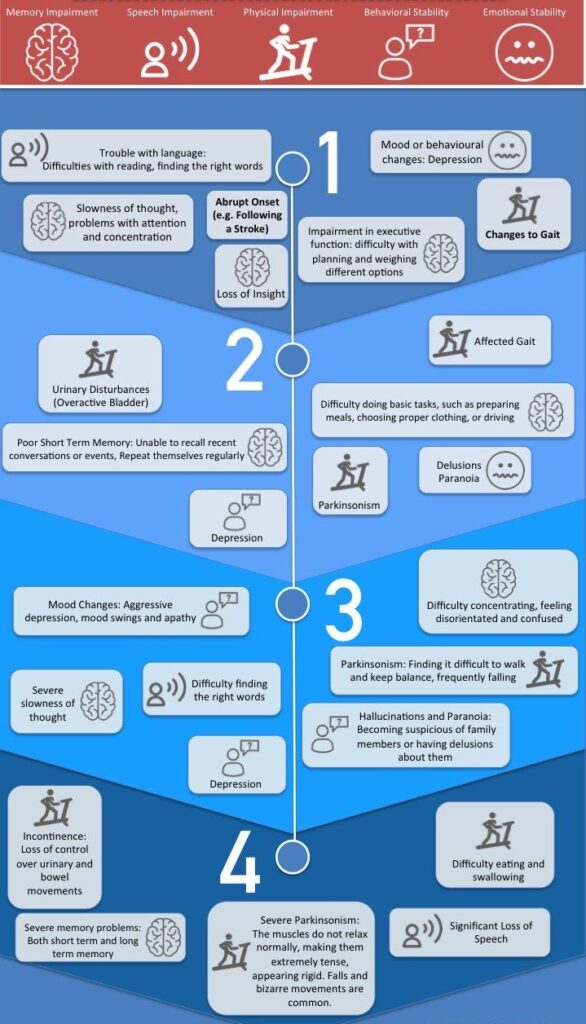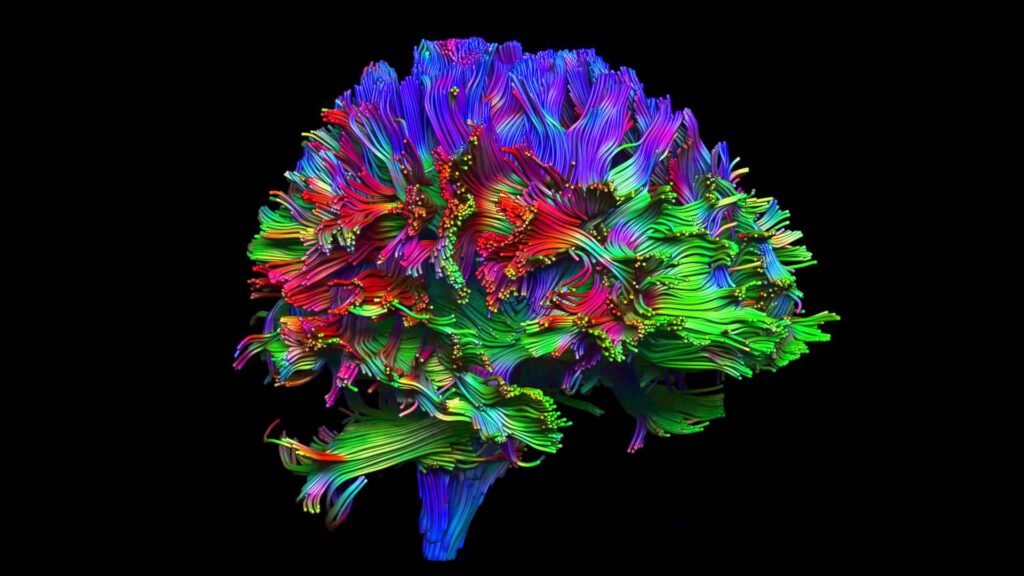VASCULAR DEMENTIA
Vascular dementia is a general term describing problems with reasoning, planning, judgment, memory and other thought processes caused by brain damage from impaired blood flow to your brain. Its stepwise worsening of symptoms noted.
Usally develop vascular dementia after a stroke blocks an artery in your brain, but strokes don’t always cause vascular dementia. Whether a stroke affects your thinking and reasoning depends on your stroke’s severity and location..
Factors that increase your risk of heart disease and stroke — including diabetes, high blood pressure, high cholesterol and smoking — also raise your vascular dementia risk. Controlling these factors may help lower your chances of developing vascular dementia.
Symptoms
Vascular dementia symptoms vary, depending on the part of your brain where blood flow is impaired. Symptoms often overlap with those of other types of dementia, especially Alzheimer’s disease dementia. But unlike Alzheimer’s disease, the most significant symptoms of vascular dementia tend to involve speed of thinking and problem-solving rather than memory loss.
Vascular dementia signs and symptoms include:
- Confusion
- Trouble paying attention and concentrating
- Reduced ability to organize thoughts or actions
- Decline in ability to analyze a situation, develop an effective plan and communicate that plan to others
- Slowed thinking
- Difficulty with organization
- Difficulty deciding what to do next
- Problems with memory
- Restlessness and agitation
- Unsteady gait
- Sudden or frequent urge to urinate or inability to control passing urine
- Depression or apathy

Vascular dementia symptoms may be most clear-cut when they occur suddenly following a stroke. When changes in your thinking and reasoning seem clearly linked to a stroke, this condition is sometimes called post-stroke dementia.
Sometimes a characteristic pattern of vascular dementia symptoms follows a series of strokes or ministrokes. Changes in your thought processes occur in noticeable steps downward from your previous level of function, unlike the gradual, steady decline that typically occurs in Alzheimer’s disease dementia.
But vascular dementia can also develop very gradually, just like Alzheimer’s disease dementia. What’s more, vascular disease and Alzheimer’s disease often occur together.
Studies show that many people with dementia and evidence of brain vascular disease also have overlapping Alzheimer’s disease.
Causes
Common conditions that may lead to vascular dementia include:
- Stroke (infarction) blocking a brain artery.Strokes that block a brain artery usually cause a range of symptoms that may include vascular dementia. These silent strokes still increase dementia risk.
With both silent and apparent strokes, the risk of vascular dementia increases with the number of strokes that occur over time. One type of vascular dementia involving many strokes is called multi-infarct dementia.
- Brain hemorrhage.Often caused by high blood pressure weakening a blood vessel leading to bleeding into the brain causing damage or from buildup of protein in small blood vessels occurring with aging weakening them over time (cerebral amyloid angiopathy)
- Narrowed or chronically damaged brain blood vessels.Conditions that narrow or inflict long-term damage on your brain blood vessels also can lead to vascular dementia. These conditions include the wear and tear associated with aging, high blood pressure, abnormal aging of blood vessels (atherosclerosis), diabetes.
Risk factors
- Increasing age. Your risk of vascular dementia rises as you grow older. The disorder is rare before age 65, and the risk rises substantially by your 90s.
- History of heart attacks, strokes or ministrokes. If you’ve had a heart attack, you may be at increased risk of having blood vessel problems in your brain. The brain damage that occurs with a stroke or a ministroke (transient ischemic attack) may increase your risk of developing dementia.
- Abnormal aging of blood vessels (atherosclerosis). This condition occurs when deposits of cholesterol and other substances (plaques) build up in your arteries and narrow your blood vessels. Atherosclerosis can increase your risk of vascular dementia by reducing the flow of blood that nourishes your brain.
- High cholesterol. Elevated levels of low-density lipoprotein (LDL), the “bad” cholesterol, are associated with an increased risk of vascular dementia.
- High blood pressure. When your blood pressure’s too high, it puts extra stress on blood vessels everywhere in your body, including your brain. This increases the risk of vascular problems in the brain.
- High glucose levels damage blood vessels throughout your body. Damage in brain blood vessels can increase your risk of stroke and vascular dementia.
- Smoking directly damages your blood vessels, increasing your risk of atherosclerosis and other circulatory diseases, including vascular dementia.
- Being overweight is a well-known risk factor for vascular diseases in general, and therefore, presumably increases your risk of vascular dementia.
- Atrial fibrillation. In this abnormal heart rhythm, the upper chambers of your heart begin to beat rapidly and irregularly, out of coordination with your heart’s lower chambers. Atrial fibrillation increases your risk of stroke because it causes blood clots to form in the heart that can break off and go to the brain blood vessels.
Prevention
The health of your brain’s blood vessels is closely linked to your overall heart health. Taking these steps to keep your heart healthy may also help reduce your risk of vascular dementia:
- Get physical exercise.Regular physical activity should be a key part of everyone’s wellness plan. In addition to all of its other benefits, exercise may help you avoid vascular dementia.
- Maintain blood pressure.Keeping your blood pressure in the normal range may help prevent both vascular dementia and Alzheimer’s disease.
- Prevent or control diabetes.Avoiding the onset of type 2 diabetes, with diet and exercise, is another possible way to decrease your risk of dementia. If you already have diabetes, controlling your glucose levels may help protect your brain blood vessels from damage.
- Quit smoking.Smoking tobacco damages blood vessels everywhere in your body.
- Keep your cholesterol in check.A healthy, low-fat diet and cholesterol-lowering medications if you need them may reduce your risk of strokes and heart attacks that could lead to vascular dementia, probably by reducing the amount of plaque deposits building up inside your brain’s arteries.
Treatment
There are also drug therapies available to treat the underlying conditions that lead to vascular dementia. These include anticoagulants, blood thinners, and other blood pressure medications. Rehabilitative therapies for speech and physical movement will also help to regain as much lost function as possible. For the patients themselves, psychological counseling, both individual and group therapies, are extremely important in order to cope emotionally with their diagnoses and motivate themselves to delaying their deterioration for as long as possible.


